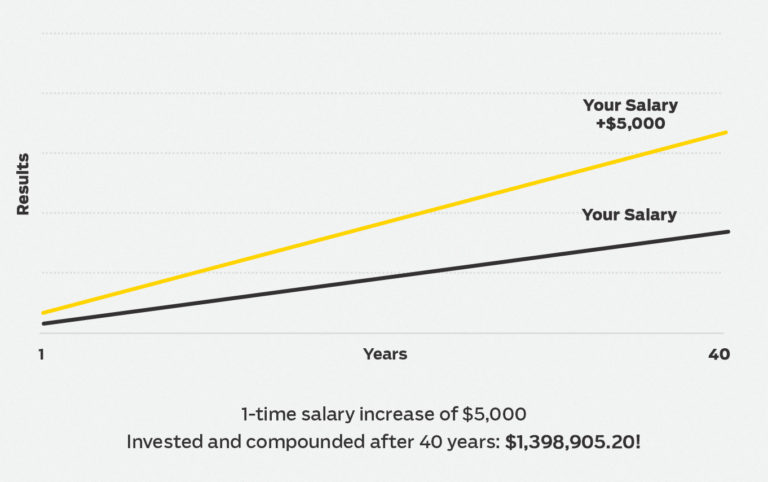Table of Contents
Last year I coached a friend on how to negotiate a job offer salary from 120k to 150k (a 25% increase!). I was so proud of her for being brave, asking for what she wanted, and playing hard ball.
The truth is, it is flat out daunting to respond to a job offer by asking for more money. It’s much easier to get swept up in the flattery of the moment. It’s a natural instinct to want to start the relationship off by being as agreeable and easy-going as possible, right?
I mean, what if by asking for more you come across too bold and they rescind the offer?
Not so fast.

The hours of your life are the most precious resources you have. Someone looking to buy them from you better be ready to pay a damn good rate.
The absolute worst thing you can do for yourself in the long run is to skip trying to negotiate a better offer in your favor.
Every job offer salary is just a starting point for negotiation.
But, is it OK to ask for more money after a job offer?
YES.
Before we dive into how to negotiate a salary job offer, here are 6 reasons WHY you must:
1. This is the golden moment where you finally have all the power.
After countless interviews and hustling to pitch yourself, you have finally sealed the deal and qualified as the candidate who is the most skilled and credentialed for the role. You will never have as much power with your employer as you do right now. Seize this moment, or you will regret it later.
Simply negotiating $5000 more – invested annually- could compound to…
ONE MILLION DOLLARS in 40 years.
You might be tempted to justify the pay difference as not worth the hassle. The truth is by not asking you could be cheating yourself out of a lot of money.

2. The move to negotiate shows off your skill set.
Negotiation is one of the most critical soft skills. Showing you have this tool in your kit is more likely to impress than offend. If you know how to negotiate for yourself then you will also bring that skill to the company.
3. Negotiation is almost expected once you land a job.
It’s one of the many bizarre and unspoken rules of the workforce. Making the move to negotiate an offer shows that you are clued into the game being played around you.
4. You have to teach people how you deserve to be treated.
Negotiating forces you to examine your own self worth and effectively communicate it to someone else. This is a confidence builder. Conveying your value will set the stage and tone for the relationship. If you value yourself, so will others.
5. Seize every possible chance to sharpen your negotiation skills.
Practicing negotiation is building a critical life skill. Even if the deal falls apart, the lesson you will walk away with will be more valuable than the money left on the table.
6. Increasing your compensation also increases your perceived value.
The weird thing about human psychology is the more you pay for something, the more you value it. For example, people who waited in line for a restaurant tended to rate their experience as more enjoyable.
Therefore, it is highly likely that asking for a weightier salary may cause your company to value and respect your time and energy more in the long run.
Do employers expect you to negotiate?
Yes.
Should you accept the first salary offer?
Not without attempting a counter offer first.
Negotiate a Job Offer for a Higher Salary in 8 Steps:
Convinced? Great. Now you know you need to negotiate your initial job offer.
So, how do you negotiate a higher salary?
Here’s how you ask for more money in a job offer:
Define your value.
How much money will you be bringing into your company directly or indirectly? This is much easier in a role such as sales in which you can directly correlate your effort with revenue.
However, every role exists because it is valuable and ties to a monetary gain for the company somehow.
Find out what that gain is. Are you building and delivering a product or service? Creating more efficient systems to save time? Building a world class brand that creates protection from competitors?
Determine your actual hourly rate based on the current offer.
Do you spend time getting ready in the morning or commuting to work? There are many hidden costs to work. Remember to also factor in your total wages earned after taxes.
Use the Life Energy Calculator to assess what your actual hourly rate and value is. Make sure you calculate based on your after tax wage, which you can use a Paycheck Calculator to determine.
Define your goals.
What salary or pay rate do you actually want? How much should you ask for? This is a complicated subject that is often entirely unique to the situation.
In an ideal world, your take home pay (after taxes) should be at least 3x times your housing expense.
Here is an absolute a bare bones scenario:
If your rent is $1000, your take home pay (after taxes) should be AT LEAST $3000, or $4000 before (accounting for a 25% tax rate).
Now that you have the increase in mind, double it.
The unspoken negotiation rule is to ask for twice of what you want so your negotiation partner can counter. If the offer is 60 an hour, but you want 65, ask for 70 so you can meet halfway in between.
Do your research.
You will be all the more effective at negotiation if you come prepared. Check out the salary stats on websites like Glassdoor such as the average salary for your title and those similar to it.
Resources you can use for research include LinkedIn, Indeed, PayScale, Salary.com, and many more.
*Side note – I grew out of salary calculators years ago. My hourly and salary rate is often double the highest range of these roles. So, don’t let these numbers box you in, and target the highest range in your negotiations (not the average).
Make it a Win-Win.
Yes – this sounds like generic advice from an 80’s sales self help manual. But it is true. Even when negotiating with your employer, make it clear you are both playing on the same team.
What should I say in salary negotiation?
Here is an example of how you can phrase your salary negotiation politely and respectfully.
“This is my dream role and I really want to make this work. I know I’ll do a better job if I’m properly compensated and can concentrate all my energy 100%.”
After all, how can you dedicate yourself fully to a position if you have to constantly side hustle to make rent, or are constantly stressed about bills or health insurance?
Buff up on your knowledge.
Books and Resources on How to Negotiate a Salary Job Offer:
My favorite reading resources to sharpen your negotiation skills are:
- Never Split the Difference by Chris Voss
- While the book is fantastic, but I much prefer his MasterClass because it conveys the subtle intricacies of body language, tone of voice, and so much more – all critical to a smooth negotiation.
- Influence by Robert Cialdini
- Predictably Irrational by Dan ArielyEmbrace the Intangibles
Salary negotiations don’t have to (and shouldn’t) be all about money. Identify what is important to you so you can enter the negotiation with lots of flexibility.
For example, I know I’m a happier and more effective employee when I work remotely. Removing a commute to work allows me to save enough money and time that I can justify a more flexible salary rate.
What is most important to YOU? Maybe it’s tax deferred accounts, health benefits, opportunity to grow, healthy company culture, or an expansive office snack varietal.
Don’t get so caught up in a “salary” or “hourly rate” number that you lose sight of building a scenario that works for you and your employer.
And REMEMBER – all of your calculations should look at the after tax money going into your pocket. Sometimes a pay increase isn’t as glamorous as it sounds when most of that green is cut by a higher tax bracket.
Find a competitive counter offer.
How do you counter offer a salary?
In an ideal world, you would either have lined up a few job offers, or are leaving your current position for another.
In both scenarios, you may be able to play a negotiation in your favor by pitting two companies in a bidding war against each other for your time.
Unfortunately, sometimes the only way for your employer to take notice that you need a raise, is to wave a new offer in front of them.
A bidding war is the perfect leverage opportunity to lay all the cards out on the table and drive the most competitive offer possible.
However, timing doesn’t always work out that way. While I’m not an advocate for dishonesty, some of my most successful mentors agree that if you need a confidence boost, you may have to fake it ‘til you make it.
That means coming to the negotiation table with a ‘pretend’ ideal counter offer from another company, to discover if your employer prospect would be willing to match.
The TRUTH about the worst that can happen:
Common sense advice says the worst that can happen is you just hear a ‘no’.
Unfortunately, this is not true.
In the spirit of full transparency, here are a few other directions a negotiation can play out:
- You happen to be an incredible negotiator, and talk your way into a high salary for a role you aren’t qualified for. Your every move is constantly scrutinized, and when you can’t live up to the high expectations, your employer finds a way to gaslight you out of the position to hire someone at a cheaper rate. F*cked up, but it happens.
- The employer balks at your counter offer, and slowly finds a way to back track out of the offer they made. Here is a podcast from Money Confidential that dives into what this experience is like and how to handle it.
A generation of women have been urged to simply ‘ask’ for higher pay to close the pay gap, but that is only part of the solution. The pay gap is a systemic issue, and just asking for a higher rate won’t solve it any time soon.
While men are expected and rewarded for playing hard to get, a woman who demands what she wants risks being labeled unfairly. For more evidence and resources on this, here is some very important reading:
The Good News:
If your employer isn’t savvy enough to be a civil negotiation partner, this is a sign of a toxic work environment that you were better off avoiding in the workplace.
The bonus of negotiating your salary is it can separate the bad eggs from the legit companies you actually want to work for.
But what if I really need the money?
The hard truth: when it comes to how to negotiate a salary job offer, the more ready you are to walk away from a deal that doesn’t work for you, the more power you have.
That is why it is critical you focus on saving to establish an F. Off fund to give you confidence in tough negotiations.
Another way to gain more leverage in a negotiation is to better convey your value as a candidate. To learn more about how to do that, read this post on how to find your dream job.
Now go out there and get it. Happy Negotiating!
